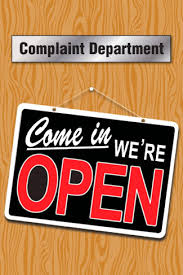Negative Customer Feedback is the Greatest Gift
 My assistant came in today happy as a clam about the steak she had for dinner last night. Hoping to score some great Iowa beef, I asked where she bought it. "They were free" she said "because the chicken I had last week was terrible." She went on to explain that her horrible chicken meal was such because it was stuffed with apples. She complained to the Meat Manager who offered to give her an upgraded replacement and promised to be more forthcoming with signs and descriptions in the future.
My assistant came in today happy as a clam about the steak she had for dinner last night. Hoping to score some great Iowa beef, I asked where she bought it. "They were free" she said "because the chicken I had last week was terrible." She went on to explain that her horrible chicken meal was such because it was stuffed with apples. She complained to the Meat Manager who offered to give her an upgraded replacement and promised to be more forthcoming with signs and descriptions in the future. This got me thinking about a customer focus group I assisted with last week, where I received an "ear full" of nasty news. During one of the sessions, one of the customers asked for a one-on-one meeting with me concerning my client. I’m not sure if this particular customer woke up on the wrong side of the bed, was having severe heartburn from the Mexican buffet served prior to the session or was just cranky, but he decided to let me have it with both barrels of nastiness. Here’s the scoop:
The customer had played an active role in the focus group. I asked questions on behalf of my client and this customer provided some great suggestions and offered up a couple of unique thoughts for new services. Our one-on-one (actually the sales manager for "the other side" was there,) however, turned out differently. In the words of the sales manager, the customer “turned on me.”
We walked into the conference room and sat down. After a brief warm up, including comments on how great it was that the sales manager’s company wanted to hear from their customers, the guy shifted the focus on his comments to issues faced when dealing with this distributor. The customer went on to say something like this:
“You know we have been buying from you for a long time, and we have gone through a lot of stuff over the years. But, we need for you to get better with providing us the products we need quickly. Your guys are good with the regular day to day products, but when we discover the need for something just slightly out of the ordinary, your service is getting worse instead of better. As a matter of fact, we never seem to get anything in less than a couple of weeks.”
Here’s where things took a surprising turn. Instead of digging deeper into the situation with questions about the nature of the parts or types of deliveries, the sales manager went on the defensive. The sales manager’s response covered a gamut of issues ranging from the size of the distributor’s inventory and the impossibility of stocking everything to how the customer needs to plan better to eliminate this type of issue. For a guy who has been in the industry for twenty plus years, I found the response to be shockingly emotional and poor. Let’s look at what might have been a better approach.
Acknowledging the feedback is critical…
In this particular situation, I would have recommended the following statement from the sales manager:
“Geeze this sounds like something we need to address for you. Let me get this straight, when you need something out of the ordinary, our service is getting worse instead of better. I can see where this could create issues for you. Thanks for sharing this important concern.”
Taking this approach indicates you are concerned for the customer’s welfare and take the feedback seriously. But just being appreciative probably isn’t enough to solve the problem. To really solve issues, you need details.
Get more clarifying details…
 It’s difficult to react to a sweeping statement like “your delivery stinks.” In order to improve, make process changes or solve problems in general, having more details simplifies the task. A customer providing painful feedback should appreciate and understand efforts to gather more background information and detail. Going back to our story, the following could have been a follow up question:
It’s difficult to react to a sweeping statement like “your delivery stinks.” In order to improve, make process changes or solve problems in general, having more details simplifies the task. A customer providing painful feedback should appreciate and understand efforts to gather more background information and detail. Going back to our story, the following could have been a follow up question:“I want to explore this situation further so we can improve. Would you be willing to share a few recent examples of the long delivery you have experienced?”
This question sends a strong message that you are concerned and you are going to explore solutions to the issues you are causing the customer. Experience dictates, customers typically calm down and get into a spirit of mutual cooperation once you start asking intelligent questions about their situation.
Give the customer a preliminary work plan…
Outlining your plan to drill into the issues presented proves you are taking the situation seriously. The customer understands you don’t have all the information. Providing a quick “off the cuff” solution without further study or work might send the message that you are willing to say anything to get through this tough conversation. Here might have been a good answer:
“Give me some time to research what is going on with our customer service group and the suppliers involved in getting the product to you. This will take me a few days and involves calls to some people who are not always at their desks. I will start gathering data right away and give you a status report in a few days.”
Note we didn’t say a solution, instead we offered a status report. It’s the old “under promise and over deliver” thing. Many times problems like this take much longer to resolve than expected; especially when others are involved.
Provide status reports along the way…
Let the customer know this wasn’t a “hear it and forget it situation.” Status reports typically can be handled with a quick phone call or email. Reports basically let the customer know what you are doing and what you have learned so far. Further, status reports should be ongoing if the problem cannot be solved in under a week. Think of it as a weekly reminder to the customer that you are still putting effort into their issues.
If a perfect solution can’t be found offer alternatives…
Let’s face it sometimes it’s impossible to give customers everything they want. Unlimited free deliveries, massively long payment terms, unlimited return privileges or infinite inventory all come to mind. If the problem can’t be addressed head on, I believe the customer should be given choices as to what actions can be made to at least alleviate the issue.
In the case of my sales manager friend, some of the following may have been good alternatives:
- The sales manager offers alternative products from suppliers with very good delivery mechanisms and creates a list of similar products which might be substituted for those which are difficult to obtain in a timely fashion.
- The sales manager assigns a person for expediting products coming from suppliers who are not normally part of the distributor’s business.
- The sales manager offers to work with the customer to develop a plan for better anticipating the unusual items required for a job.
Applying Scientific Theory from Human Sigma: Managing the Employee-Customer Encounter…
 Mistakes happen, it is the nature of human encounters. Research outlined in the book point to a couple critical thoughts. First, customers who have problems (and provide negative feedback) which are handled properly are more loyal than a customer who encounters no problems. Secondly, employees (typically outside and inside employees) need to be trained and empowered to handle negative feedback.
Mistakes happen, it is the nature of human encounters. Research outlined in the book point to a couple critical thoughts. First, customers who have problems (and provide negative feedback) which are handled properly are more loyal than a customer who encounters no problems. Secondly, employees (typically outside and inside employees) need to be trained and empowered to handle negative feedback. Negative feedback is the greatest gift…
When you receive no negative feedback, you should assume something is wrong. Every organization, regardless of its business prowess, makes mistakes. Customers who take the time to tell you about mistakes are giving you the opportunity to save the business and build a better long-lasting relationship. Thinking back to my assistant and her terrible apple chicken. Had she kept quiet, others may have been just as unpleasantly surprised to receive the same meal. She provided negative feedback and changes were made for her and future customers. She will continue to shop at that location. Customer retention is huge for distributors. Accept the gift and make something good of it…



Comments